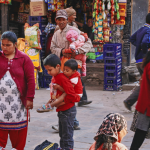“A curry that is not stirred and a child that is not hit are both spoilt.”
This age-old proverb captures how corporal punishment is normalised in Sri Lankan society even today.
What is Corporal Punishment?
The United Nations Committee on the Rights of the Child defines corporal punishment as “any punishment that involves the use of physical force and is meant to cause some pain or suffering, however little.” When delivered harshly or frequently, it may amount to serious physical abuse.
In Sri Lanka, such abuse is viewed as a necessary form of punishment to “fix” children and their perceived problematic behaviour. Even students who may exhibit certain behaviours due to undiagnosed mental health conditions are subjected to severe physical abuse. Parents and teachers alike frequently claim that “beating” their children into shape is the only way to raise them to be “good people.” Usually, it is difficult to question or change such habits as doing so is seen as undermining an established cultural norm.
A Landmark Judgment in Sri Lanka
However, in a landmark decision issued on 12 February 2021 in Hewa Maddumage Karunapala and others v Jayantha Prema Kumara Siriwardhana and others Case No. SC/FR/97/2017, the Supreme Court of Sri Lanka prohibited the use of corporal punishment against children in schools.
On 17 March 2017, a child and his parents filed a petition against public school teachers and administrators. One of the teachers had brutally struck the child, then 15, across the face, resulting in a lifelong hearing impairment. The petitioners claimed that the teacher’s actions constituted torture and other forms of cruel, inhuman, or humiliating treatment or punishment as defined by Article 11 of the Constitution.
The petition was successful and, in 2021, led to a ruling concluding that by subjecting the kid to harsh and humiliating treatment, the instructor, the school, and the State had violated Article 11 of the Constitution.
The case highlighted that corporal punishment is a clear violation of Article 11. For the first time in Sri Lankan legal history, a precedent was established stating that “Children are entitled to their own sense of self and dignity being separate beings… minors as vulnerable and impressionable members of society must be entitled to a higher degree of protection.”
Since an adult in the same circumstances would be entitled to such relief under the Penal Code of Sri Lanka and other pertinent statutes, the court reasoned that it would be unacceptable to think that a child who has been so severely abused will not be entitled to any remedy simply because they are seen as a minor in the eyes of the law.
National campaigners claim that while the Supreme Court’s ruling is a positive step in the right direction, it does not effectively stop physical punishment in schools and is not likely to result in legislation being changed. However, the government has stated that it will modify its laws to prohibit corporal punishment in all circumstances and has also pledged to do so internationally in its 2017 report to the Committee on the Rights of the Child. In the report, the government acknowledged a vacuum in the law and stated that “introducing a bill to outlaw physical punishment” was a priority.
What Does the Law Say Today?
Regardless of such developments, our laws currently justify the use of corporal punishment. For instance, while Article 71 of the Children and Young Persons Ordinance (1939) makes it illegal to treat children and young people cruelly, Article 71(6) establishes that “Nothing in this section shall be construed as impairing the right of any parent, teacher, or other person having lawful control or charge of a child or young person to administer punishment to him.”
Hence, such abuse of children is still permitted in Sri Lanka within the family, at school, and in a variety of care settings, including public and private daycare institutions, residential facilities, foster homes and so on. Although corporal punishment is prohibited in schools according to Section 2 of the Ministry of Education’s Circular No. 2005/17, the decision was only reaffirmed by the Supreme Court very recently.
The fact of the overall state of affairs is that, even after the Hewa Maddumage decision, there has been no attempt at legal reform regarding this matter and no parliamentary interest in taking the necessary action. Reports of children being beaten, punished and abused in schools in an effort to turn them into “more civilised people” persist unabated.
iProbono’s Intervention
Due to this gap in the law and its application, iProbono, a strong advocate for the rights of children in Sri Lanka, met with the Bar Association of Sri Lanka in September 2022. We were able to discuss the current laws presiding over child protection and corporal punishment alongside our partner organisation, Stop Child Cruelty Trust, the media unit of Sri Lanka Law College, and other related organisations.
The meeting highlighted some of the key law provisions, which were inconsistent with the best interest of children and contradicted established precedent. These are:
- Section 82 of the Penal Code 1883 states that “nothing, which is done in good faith for the benefit of a person under twelve years of age, or, of unsound mind, by or by consent, either express or implied, of the guardian or other person having lawful charge of that person, is an offence by reason of any harm which it may cause/or be intended by the doer to cause, or be known by the doer be likely to cause, to that person….”
- Illustration (i) of the offence of “criminal force” (Section 341) states that a schoolmaster who flogs a student is not using force illegally.
- Section 308A, which allows multiple loopholes:
Ex: Penal Code 308A states that if there is only suffering and injury to the health of a child, one can be prosecuted under the law of corporal punishment. However, if corporal punishment is done in good faith, it is not illegal under Article 82 and Section 341 of the Penal Code states that a child can even be flogged if the force is not illegal. This contradicts Section 308A.
The Bar Association has expressed interest and commitment to hasten legal reform that tackles the aforementioned issues and broader gaps in the law relating to child rights. While continuing to explore many avenues in order to make Sri Lanka a safer place for all children, iProbono awaits encouraging legal developments.
Kaveesha Coswatte, Advocacy Officer, iProbono Sri Lanka







